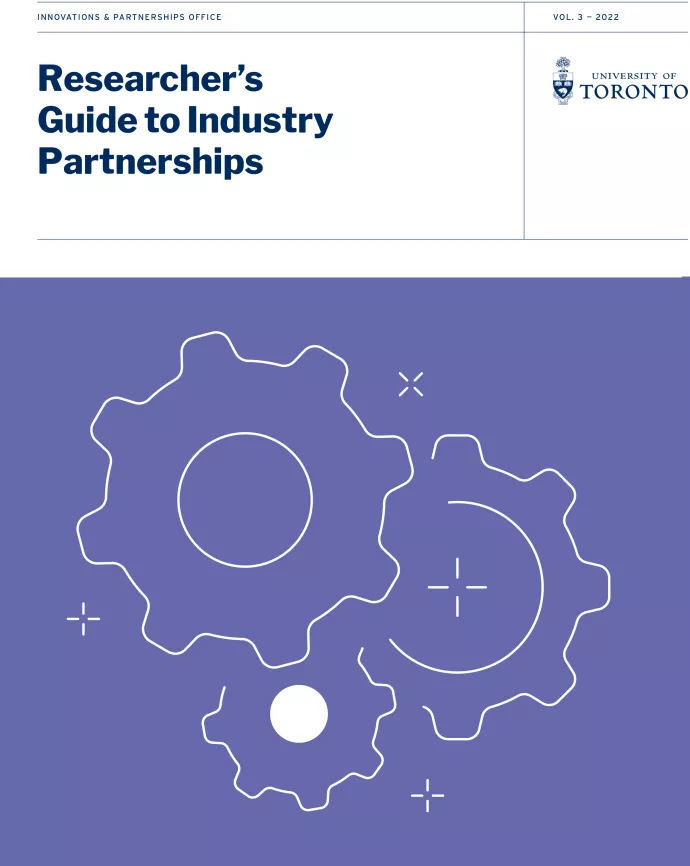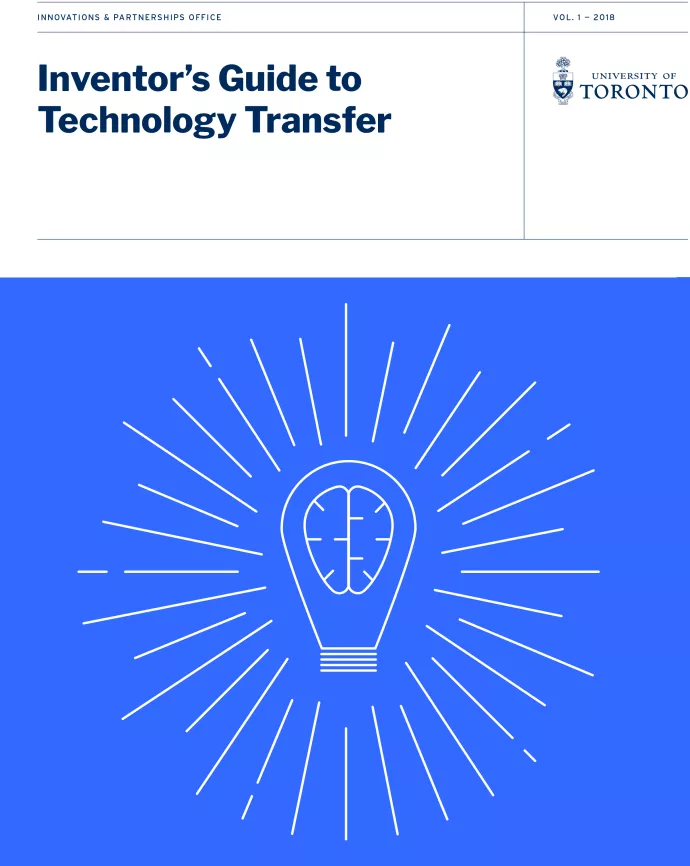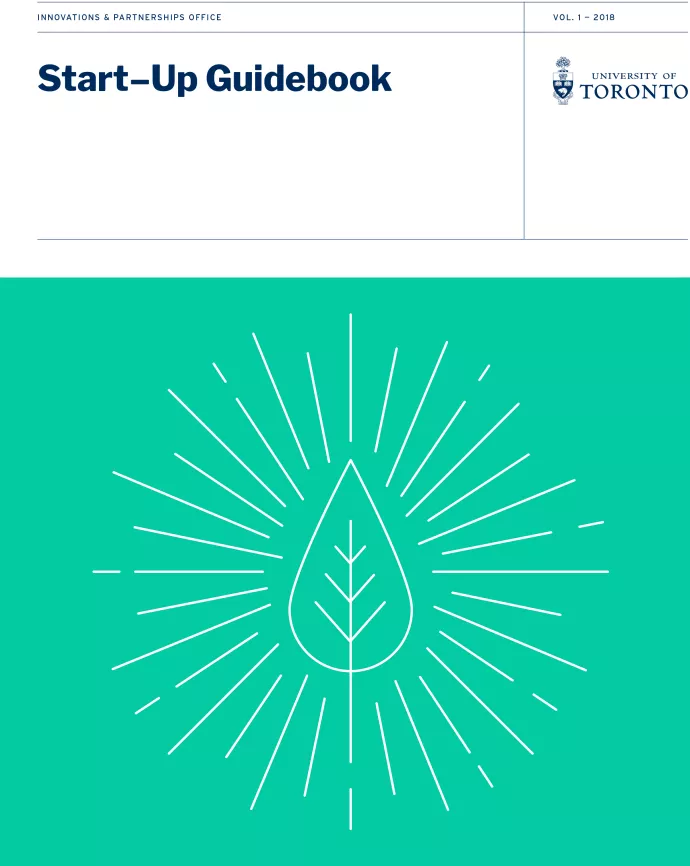Jump to:
Intellectual Property | Legal Obligations of Research Agreements | Guides
Intellectual Property
At its core, academic research requires all researchers, from students to senior faculty, to abide by the University of Toronto's intellectually property policies, while respecting the intellectual property rights of others. In such a complex research environment it can be easy for misunderstandings to arise about the IP rights and obligations that students and faculty have with respect to each other, the University, other colleagues, or even a granting agency or company funding the research activities.
Intellectual Property (IP) Education Program
The University has developed a free online program design to equip students, faculty, staff, and alumni with a broad foundation in intellectual property. To access the program, please follow this link: https://entrepreneurs.utoronto.ca/resource/ip-foundations/#registration.
The University of Toronto’s Research and IP Policies
In academia, intellectual property is often the product of work accomplished with input from multiple individuals:
- The concept for a research project or thesis may originate with a faculty member.
- Research supervisors provide tutelage, guidance, and interpretation to graduate students and others involved in a research project or thesis.
- Students, postdoctoral fellows, research associates, and research technicians may each contribute to the creation and development of intellectual property under the supervision of a faculty member.
The subsequent rights to intellectual property developed in this collaborative way belong to the creators of the intellectual property (and the University, in accordance with the University's policies) and the onus lies with the research group to agree on the relative individual contributions.
The University of Toronto’s publication policy affirms that UTM researchers, including faculty, staff and students, will always have the right to publish the results of their research activities, assuming that they do not disclose another’s confidential information in the content of the proposed publication. In some circumstances there may be a contractual agreement between the University and a research sponsor which may grant the sponsor the right to review or delay a proposed publication. Such a delay should not exceed twelve months and should not ordinarily apply to the publication of a graduate student’s thesis.
According to the copyright policy, in most circumstances the creator of a work owns the copyright for that work. If a work was created with a substantial use of University resources, then the University reserves the right to a 25% share of net revenue generated by the work and the right to use the work for research and teaching purposes. The University will only claim copyright ownership in works which are specifically commissioned by the University or which are created by administrative staff in the course of their employment at the University. While software is protected legally by copyright, for the purposes of the University’s policies, computer software (excluding instructional applications) is to be considered an invention, and is subsequently covered under the inventions policy rather than the copyright policy.
The inventions policy states that the inventor and the University normally share the rights to an invention, unless a third party, such as a corporate sponsor, is granted rights in a preexisting contractual agreement. An inventor may choose to assume full responsibility for the legal protection and commercialization of the invention. In this case, the University will assign its rights to the inventor in return for 25% of future net revenues. If the inventor does not want to assume the legal and commercialization obligations for the invention, then the University may require the inventor to assign all his/her rights to the University in return for the first $1,000 of, and 25% of subsequent, net revenues.
All University researchers have an obligation to disclose the details of their inventions and/or discoveries to the University through the Confidential Invention Disclosure form. Upon disclosure, the University will work with the inventor or the team of inventors to determine the best course of action as per the Inventions policy.
According to the conflict of interest policy, some research activities require the prior written approval of the appropriate U of T Mississauga Chair, Director, or Dean:
- All major paid professional activities, such as private research consulting activities;
- The use of UTM facilities, supplies, support staff, or students for privately undertaken work or research consulting activities;
- The hiring of, purchasing from, selling to, or conferring or denying any financial or commercial benefit on any member of the faculty member's immediate family or a person with whom there exists, or has recently existed, an intimate personal relationship; and
- Any research undertaken by a faculty member for a company or organization in which a significant financial interest is held by the faculty member, any member of the faculty member's immediate family, or any person with whom there exists, or has recently existed, an intimate personal relationship.
As a guideline, co-authorship should be recognized where the individuals have participated in a significant way in at least two of the following aspects of the research:
- conception of idea and design of research or scholarly inquiry;
- actual collection of data collection, experiment or hands-on laboratory work; or
- analysis and interpretation of data, and/or actual writing of the manuscript.
Inventorship is restricted to those who make an original, inventive and substantive contribution to an invention. All members of a research team, regardless of position, who make an original, inventive and substantive contribution to the invention should be entitled to credit by being identified as a co-inventor.
Legal Obligations of Research Agreements
There are additional intellectual property issues to consider if a research project:
- has been funded by external sources;
- makes use of materials borrowed or transferred from an external source;
- makes use of information shared with the researcher in confidence; and/or
- is conducted collaboratively with another institution.
Research agreements may grant a sponsor rights to resulting intellectual property, and may give the sponsor the right to delay a publication arising from the research. Faculty researchers must understand the intellectual property clauses of their funding agreements in order to fully disclose the implications to the students and colleagues engaged in the work.
Companies that provide materials to university researchers tend to have lengthy material transfer agreements that may include intellectual property ownership and confidentiality clauses. Extreme care must be taken when reviewing these agreements, and researchers are well advised to remember that these agreements must be reviewed and endorsed by the University.
These agreements have the potential to jeopardize a scholar's ability to publish the results of her own research efforts, so as with material transfer agreements. As such, these agreements must be reviewed and endorsed by the University.
When financial resources are being transferred between collaborating institutions, a sub-grant or sub-contract agreement is used to clarify the obligations of each institution and to address the intellectual property issues.
Guides
The University of Toronto has created guides for the U of T community on:
- The process of engaging with an industry partner, and types of partnership engagements;
- The technology transfer process and services available to researchers; and
- How to launch a startup based on intellectual property developed at U of T.



